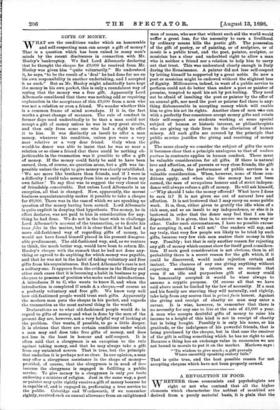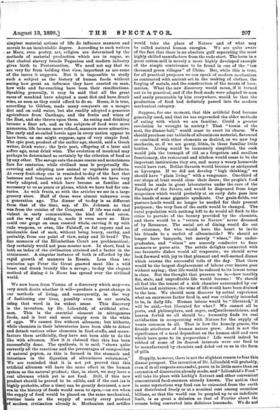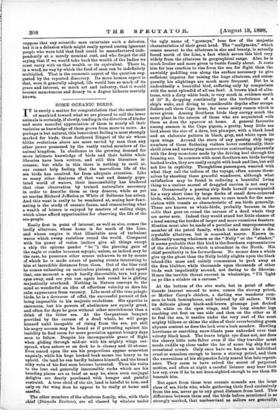A REVOLUTION IN FOOD.
WHETHER those economists and psychologists are right or not who contend that all the higher elements which characterise the noblest of mankind are derived from a purely material basis, it is plain that the simplest material actions of life do influence manners and morals to an incalculable degree. According to such writers as Marx, even poetry, art, religion are determined by the methods of material production which are in vogue, so that chattel slavery breeds Paganism and modern industry gives birth to Protestantism. We need not say that we are very far from holding that view, important as are some of the issues it suggests. But it is impossible to study such a subject as the history of human foods without seeing how great an influence they have exerted on man, how wide and far-reaching have been their ramifications. Speaking generally, it may be said that all the great races of mankind have adopted a meat diet and have drunk wine, as soon as they could afford to do so. Rome, it is true, according to Gibbon, made many conquests on a meagre diet and on cold water, but she readily adopted a generous agriculture from Carthage, and the fruits and wines of the East, and she throve upon them. As eating and drinking became a finer art, and as the subjects of food were more numerous, life became more refined, manners more attractive. The early and so-called heroic ages in every nation appear to have been, as one might suppose, ages of very simple food. The epic poet, product of the earlier age, should, said a Greek writer, drink water ; the lyric poet, offspring of a later and softer age, must drink wine. The evolution of mankind may perhaps be determined as certainly by the criterion of food as by any other. The savage eats the same coarse and monotonous fare for centuries, while civilised man is perpetually dis- covering and adopting new animal or vegetable products. At every fruit-shop one is reminded to-day of the fact that bananas and tomatoes are new foods which we have very wisely adopted, and which have become as familiar and necessary to us as pears or plums, which we have had for cen- turies. As with fruits, so with the articles we see in a large grocery store. Half of these were almost unknown even a generation ago. The dinner of to-day is as different from that of the time, say, of Dr. Johnson as that was from the cuisine of the Conquest. If life was rude and violent in early communities, the kind of food eaten, and the way of eating it, made it even more so. How could one gorge on oxen roasted whole, carving it up with rude weapons, or even, like Falstaff, on fat capons and an intolerable deal of sack, without being, heavy, earthy, and probably, from our point of view, noisy and ill-bred ? The fine manners of the Elizabethan Court are problematical ; they certainly would not pass muster now. In short, food is both an index of the civilisation attained and a factor in the attainment. A singular instance of both is afforded by the rapid growth of manners in Russia. Leas than two centuries ago Peter the Great gnawed meat like a wild beast and drank brandy like a savage ; to-day the elegant method of dining a la Busse has spread over the civilised world.
We now learn from Vienna of a discovery which may—we very much doubt whether it will—produce a great change in our methods of living, and consequently, in the way of fashioning our lives, possibly even in our morals, using that word in its widest sense. This discovery is the invention, by Dr. Lilienfeld, of artificial albu- men. This is the essential element in nitrogenous foods, and is best and most simply seen in the white of eggs. We cannot live without albumen; but hitherto, while chemists in their laboratories have been able to detect and detach various other elements in food-stuffs, and manu- facture them artificially, they have not been able to do the like with albumen. Now it is claimed that this has been successfully done. The synthesis, it is said, " shows quite correctly all the reactions and the percentages of composition of natural pepton, as this is formed in the stomach and intestines in the digestion of albuminous substances." We are reminded that it is not yet proved that this artificial albumen will have the same effect in the human system as the natural product; that, in short, we may have a real albumen which yet is not food. Still, if this new product should be proved to be edible, and if the cost (as is highly probable, after a time) can be greatly decreased, a new era in the history of foods would seem to open,—an era when the supply of food would be placed on the same mechanical, routine basis as the supply of nearly every product f modern civilisation already is. Mechanism and artifice would take the place of Nature and of what may be called natural human energies. We are quite aware of the fact that there is no absolute gall separating the most highly skilled manufacture from the rude start. The loom in a great cotton-mill is merely a more highly developed example of the simple contrivance to be found in one of the "ten thousand green villages" of China. But, while this is true, for all practical purposes we can speak of modern mechanism as contrasted with ancient art in the making of clothes, the forging of metals, and the construction of the means of loco- motion. What the new discovery would mean, if it turned out to be practical, and if the food made were adapted to man and easily procurable by him everywhere, would be that the production of food had definitely passed into the modern mechanical category.
Suppose, for one moment, that this artificial food became generally used, and that its use superseded the older methods of eating with which we are familiar. Could a greater revolution be wrought in society ? That "tocsin of the soul, the dinner-bell," would cease to exert its charm. We should purchase our tabloids of albuminous material, flavoured or combined with other elements as desired, as we now buy saccharin, or, if we are gouty, lithia, in those familiar little bottles. Living would be immensely simplified, the cook would join the turnspit of old as a forgotten and needless functionary, the restaurant and kitchen would cease to be the important institutions they are, and many a weary housewife would have rest. Brillat-Savarin would become as antiquated as Lycurgus. If we did not develop " high thinking," we should have " plain living " with a vengeance. One-third of our shops at least would close their doors; the people's food would be made in great laboratories under the care of the Faradays of the future, and would be dispensed from huge magazines which would probably at an early date pass into the bands of some gigantic syndicate. Our grain-fields, our pasture-lands would no longer be needed for their present purposes ; the very face of the earth would be changed. The rural population with nothing left to do would all flock to the cities to partake of the bounty provided by the chemists, and there would be a "return to Nature" never dreamed of by Rousseau. The social art of dining would die out of existence, for who would have the heart to invite his friends to a surfeit of albuminoids ? We should no longer have banquets, but merely " wines," like under- graduates, and " wines " are scarcely conducive to finer manners or purer arts. The subtle delights connected with our favourite dishes would all evaporate; we should never look forward with joy to that pleasant and well-earned dinner which crowns the successful toils of the day. That there would be the largest displacement of labour ever known goes without saying ; that life would be reduced to its lowest terms is clear. But the thought that pursues us is,—how terribly flat, stale, and unprofitable life would become ! We should all feel like the tenant of a sick chamber surrounded by ow bottles and mixtures ; the wine of life would have been drained to the lees. We should soon discover by actual experience what an enormous factor food is, and was evidently intended to be, in daily life. Human labour would be " liberated," it will be said,—but liberated for what ? We cannot all be poets, and philosophers, and sages, and:mathematicians, and heaven forbid we all should be ; humanity finds its real satisfaction in co-operating with Nature for the supply of wants common to all. That is how the homely graces, the fireside attributes of human nature grow. And is not the significance of a meal dependent on the human skill and care which have gone to its preparation ? Life would indeed be robbed of some of its dearest interests were our food to be manufactured by chemists and doled out to us in the form of pills.
Happily, however, there is not the slightest reason to fear this dismal prospect. The invention of Dr. Lilienfeld will probably, even if in all respects successful, prove to be little more than an extension of discoveries already made, and " Lilienfeld's Food" will take its place with Liebig's Extract and other convenient concentrated food-essences already known. The notion that in some mysterious way food can be extracted from the earth and distributed freely or at a nominal cost among countless billions, so that the world can be peopled up to an indefinite limit, is as great a delusion as that of Fourier about the oceans being converted into delicious lemonade. We do not suppose that any scientific man entertains such a delusion, but it is a delusion which might easily spread among ignorant people who were told that food could be manufactured inde- pendently at a merely nominal cost, and who forget the old saying that if we would take back the wealth of the Indies we must carry with us that wealth or its equivalent. There is, in a word, no way by which the food of man can be indefinitely multiplied. That is the economic aspect of the question sug- gested by the reported discovery. Its more human aspect is that, were it generally adopted, life would lose so much of its grace and interest, so much art and industry, that it would become monotonone and dreary to a degree hitherto scarcely known.




































 Previous page
Previous page